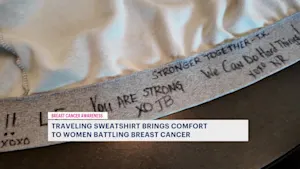Kosovo War refugee teaches about combating hate across New York state in Mobile Museum of Tolerance
Arlind Alidema, a traveling educator with the Mobile Museum of Tolerance, had a warning about what can happen when hateful propaganda runs rampant.
Share:
More Stories

Judges order the Trump administration to use contingency funds for SNAP payments during gov't shutdown
12m ago2:10

WIND ALERT: Windy conditions with some sunshine heading into the weekend for The Bronx
2h ago1:58

Water restored to Van Nest homes day after massive main break
2h ago
FDA: New Jersey-based Teva Pharmaceuticals USA has recalled a blood pressure medicine tainted with a cancer-causing chemical
6h ago1:26

Flooding aftermath in Mott Haven still prevalent less than 24 hours later
7h ago2:12

A hoodie and hope: New Jersey women share sweatshirt to bring comfort during breast cancer treatment
7h ago
Judges order the Trump administration to use contingency funds for SNAP payments during gov't shutdown
12m ago2:10

WIND ALERT: Windy conditions with some sunshine heading into the weekend for The Bronx
2h ago1:58

Water restored to Van Nest homes day after massive main break
2h ago
FDA: New Jersey-based Teva Pharmaceuticals USA has recalled a blood pressure medicine tainted with a cancer-causing chemical
6h ago1:26

Flooding aftermath in Mott Haven still prevalent less than 24 hours later
7h ago2:12

A hoodie and hope: New Jersey women share sweatshirt to bring comfort during breast cancer treatment
7h agoSuffern Middle School students boarded a bus in the parking lot Wednesday for a lesson on combating online hate that, at times, was uncomfortable.
Arlind Alidema, a traveling educator with the Mobile Museum of Tolerance, had a warning about what can happen when hateful propaganda runs rampant.
Alidema's personal story is relevant to the lesson.
When he was five years old, his family was forced from their home in Kosovo simply because they were Albanian.
Government propaganda painted Albanians as savage criminals and rapists, which led to the Kosovo War.
More than a million people were displaced, and though they were eventually able to return to Kosovo, many of their homes were looted and/or destroyed.
"At the root of all of it, it's hate, thinking that other people are less than you," he said to his morning class of about 25 students. " 'They don't belong here. They gotta leave. They gotta go.' — The impact of hate can go that far."
Alidema showed the group a modern-day example, the online game 'Border Patrol' in which players must prevent Mexicans from crossing the border, shooting them if necessary.
The game stayed online for five years until the museum successfully lobbied the game offline, Alidema said.
"Five or six years from the time they first start playing the game, what do you think they're going to think about Mexican people?" he asked the students, to which one correctly responded: "They're going to think that all stereotypes are true."
Alidema wants students to report hateful posts they see on their feeds to social media companies.
He has seen what can happen when such hate is left unchecked.
"Take those lessons to actually have the right tools to confront bigotry, antisemitism, hatred," he said.
Some students said the class helped them realize they should not just ignore some of the problems they see on social media anymore.
"Not many care about what's posted in comments on social media," Eighth-grader Emily John said, "and they kind of think that if they don't say anything, they fit in with the people who don't talk about it."
New York and four other states are funding a range of mobile museum lessons on tolerance, allowing educators to reach 150,000 students a year.
Alidema said to fix hate, social media users, especially young people, must make a serious commitment.
"I am nervous about the future," he said. "Every one of us has a role to actually reflect and do our part so we don't have history repeat."
More from News 12
1:58

Water restored to Van Nest homes day after massive main break
2:10

WIND ALERT: Windy conditions with some sunshine heading into the weekend for The Bronx
1:26

Flooding aftermath in Mott Haven still prevalent less than 24 hours later
0:23

Knife-wielding duo wanted for stealing a Citi Bike from another rider in University Heights
1:48

Tenant knocked unconscious after kitchen ceiling collapses in Morris Heights
